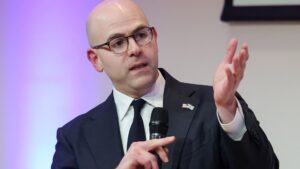Raskin Faces Senate Questions Over Views on Climate Change, Regulations

Sarah Bloom Raskin, President Biden’s nominee to become the government’s top bank regulator, defended her views on using financial regulation to address climate change—positions cheered by Democrats but criticized by Republicans.
The three nominees told lawmakers that the Fed must make it a priority to tackle high inflation. “The spike in inflation we are seeing today threatens heightened expectations of future inflation,” Mr. Jefferson said. “The Federal Reserve must remain attentive to this risk and ensure that inflation declines to levels consistent with its goals.”
Asked about the Fed officials’ recent signals that they would begin steadily raising interest rates in mid-March to combat price pressures, Dr. Cook said she agrees with the Fed’s path right now, but added that she would want to analyze data closer to any decision, should she be confirmed.
Ms. Raskin’s calls for the Fed to play a more active role in combating climate change have attracted opposition from Republicans. In a New York Times opinion article in May 2020, Ms. Raskin was critical of broad-based emergency-lending backstops enacted by the Treasury and Fed to assist businesses during the pandemic, because she believed they should have taken steps to prevent lending to oil-and-gas concerns.
“The decisions the Fed makes on our behalf should build toward a stronger economy with more jobs in innovative industries—not prop up and enrich dying ones,” she wrote.
Republicans say addressing climate change goes beyond the Fed’s mandate. “Unelected officials like Ms. Raskin want to misuse bank regulation to impose environmental policies that Congress has refused to enact,”
Sen. Pat Toomey
of Pennsylvania, the ranking Republican on the committee, said at the hearing. “Ms. Raskin has repeatedly and specifically advocated that the Fed allocate capital away from the fossil-fuel industry as a way to combat climate change.”
Asked by Republicans if she was reversing her prior positions on climate change, Ms. Raskin said her views have remained consistent. She said it is not the Fed’s job to pick winners and losers in the financial system and added, “it is inappropriate for the Fed to make credit decisions and allocations. Banks choose their borrowers, not the Fed.”
Mr. Toomey pushed back. “Are you saying you no longer hold these views that you stated about allocating capital as a result of your perception of this risk?” he asked.
Ms. Raskin said her views haven’t changed. “The Fed should not pick winners and losers, they should not be exposing taxpayers to undue risk,” she said.

Philip Jefferson has been nominated to be a member of the Fed’s board of governors.
Photo:
ken cedeno/pool/Shutterstock
Ms. Raskin, a lawyer, served as a Fed governor and as a top Treasury Department official during the Obama administration. Before that, she served as Maryland’s state commissioner of financial regulation. She is a law professor at Duke University and is married to
Rep. Jamie Raskin
(D., Md.).
Senate Banking Committee Chairman
Sherrod Brown
(D., Ohio) praised all three nominees at the start of the hearing, saying they “understand the importance of empowering workers through full employment, and the need to combat inflation so paychecks go farther.”
Ahead of the hearing, the U.S. Chamber of Commerce urged Senate lawmakers to scrutinize Ms. Raskin’s views on climate change and other matters, while 41 oil-and-gas trade groups pressed lawmakers to oppose her, citing her stances on climate change.
Ms. Raskin hasn’t encountered opposition from banks that helped torpedo the nomination of Saule Omarova, an academic Mr. Biden tapped last year for a separate post overseeing national banks. That fight was led by community banks, which have a more favorable view of Ms. Raskin from her former stints in government.
The American Bankers Association and the Financial Services Forum, which represents the largest U.S. lenders, issued statements congratulating her on her nomination.
With a closely divided Senate, Mr. Biden needs either the support of all Democrats to confirm his nominees, or support from some Republicans to overcome holdouts from his own party.

Lisa Cook, a professor at Michigan State University, is nominated for a Fed board seat.
Photo:
bill clark/Agence France-Presse/Getty Images
At least some moderate Democrats on the Senate banking panel who may hold the key to Ms. Raskin’s confirmation have signaled they would likely support her. Sen. Mark Warner of Virginia said he was pleasantly surprised that bankers in his state found her to be a “fair and balanced regulator” and that he believed that “bodes well for you.”
SHARE YOUR THOUGHTS
How will the latest slate of nominees affect the Fed? Join the conversation below.
Montana Sen. Jon Tester said Tuesday that he “had a nice meeting with her, and I’ll see how the hearing goes.” He said Ms. Raskin’s nomination had raised “no red flags as of yet.”
The confirmations of Dr. Cook and Mr. Jefferson, who are Black, would help Mr. Biden fulfill his promise to improve diversity atop the central bank, which in its history has had only three Black board members, all of them men. The most recent was former Fed Vice Chairman
Roger Ferguson,
who left the board in 2006.
“We’ve never had a table of people sitting at the Fed like you,” said Mr. Brown, adding that he believed the U.S. would be well served by their diverse backgrounds.
Write to Andrew Ackerman at andrew.ackerman@wsj.com
Copyright ©2022 Dow Jones & Company, Inc. All Rights Reserved. 87990cbe856818d5eddac44c7b1cdeb8








